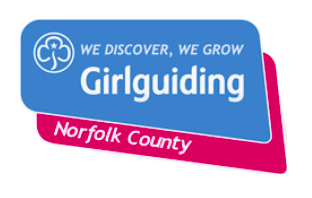Girlguiding Norfolk County
Background to the Project
Girlguiding Norfolk County was looking to make accessible its growing collection of Norfolk Girlguiding archives, uniforms and memorabilia and made the decision to build an Archive Resource Centre (ARC).
They have collected around 30,000 items telling the stories not only of Girlguiding in Norfolk but also mirroring social history.
Inspired by Girlguiding Cymru’s record digitisation project Girlguiding Norfolk reached out to Gary Tuson, Norfolk Archivist at Norfolk Record Office (NRO) to see if they could achieve something similar and if NRO could facilitate it. Discussions led the NRO to make a bid to NLHF to support a variety of different community groups working to digitise their collections.
The Project Requirement
The bid was successful and Girlguiding Norfolk County received support from two community archivists to train volunteers in archive skills, such as cataloguing the collection, digitisation and recording oral history interviews. This will mean people now, and in the future, can locate and consult historically important resources. To date all training has been accessed virtually and published online for everyone to access, including other Girlguiding archivist colleagues throughout Anglia and indeed the UK. Having access to sessions online after live sessions has been invaluable as training has reached a wider audience, and the resources provided have been helpful in supporting GGN to write documents appropriate to its situation.
The Outcomes
‘This project is going to make a huge difference to our archive resource centre and to reaching a wider and potentially international audience. We have high expectations of the project, aiming to have a minimum of ten volunteers trained in the digitisation process initially, but with the potential to expand this and ensure sustainability.
The digitisation aspects are being led by a volunteer, a master’s graduate, who is grateful to have this opportunity, when paid employment in the sector is currently challenging. We also have another young person successfully leading the oral history aspect of the project; she is using this voluntary work to contribute towards her Queen’s Guide Award, the highest award in Girlguiding. Indeed, with people accessing many things virtually now, it has been much easier than setting up face-to-face meetings with young people, as the ‘new norm’ of virtual is becoming the way forward.
Using Archive Services
“As a result of having conversations when ideas were just seeds, we have been inspired to see what is actually possible by thinking wider and talking to the experts!
We cannot speak more highly of the team delivering this project in challenging and frustrating times and are grateful for all they have done to date and will continue to do. Indeed, support from NRO to Girlguiding, not your ‘normal community archive’, over the years has always been positive, encouraging, supportive and of the highest professional standard. We are and continue to be very grateful. Thank you!”
Girlguiding Norfolk County Archivist


